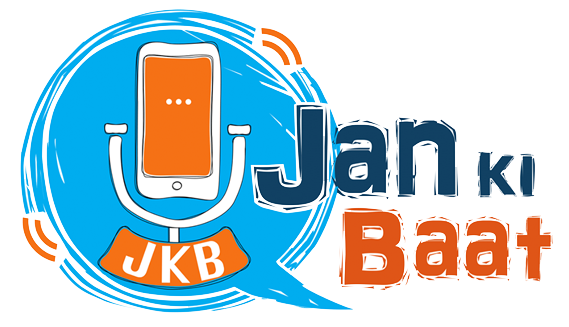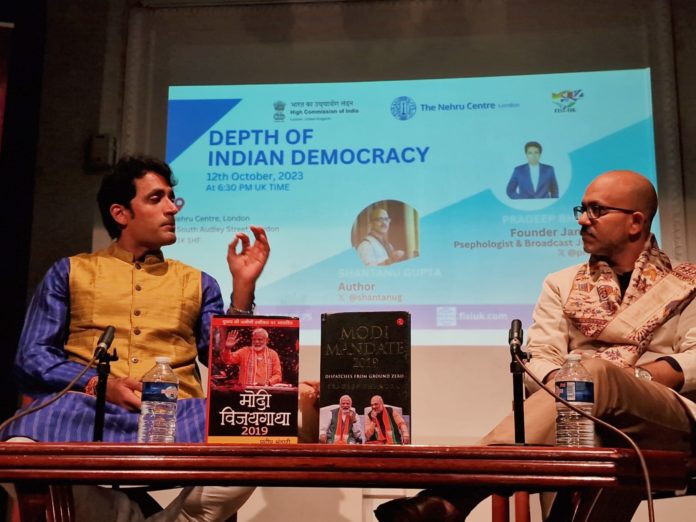In a thought-provoking event titled ‘Depth of Indian Democracy,’ organized by Friends of Indian Society International (FISI), UK, Pradeep Bhandari, the Founder of Jan Ki Baat and a distinguished broadcast journalist, shared profound insights on the Indian voter and the dynamics of democracy. The event, held at the prestigious Nehru Centre in London on October 12th, 2023, gave a platform for Pradeep Bhandari to shed light on the remarkable intelligence of the Indian voter, the role of women voters, and the depth of democracy in India.
The Power of the Informed Indian Voter:
“Indian voter is extremely intelligent. What I’ve seen on the ground is that it’s not the caste or religion that matters so much to the voter but it’s your work that determines why he or she will vote for you,” Pradeep Bhandari asserted.
This statement encapsulates the evolving nature of the Indian electorate. While factors like caste and religion have historically influenced voting decisions, there is a discernible shift towards a more informed and demanding voter base. The Indian voter is increasingly focusing on the work done by politicians, prioritising tangible improvements and accountability over identity-based considerations.
The Triumph of the People-Centric Approach:
“Victory of independent candidates like Navneet Rana and Sumalatha Ambareesh are testament to the fact that in India when you work for the people, you can even defeat national parties,” Pradeep Bhandari highlighted.
The success of independent candidates signals a democratic landscape where people are willing to support those who truly represent their interests, even if it means going against the tide of established political structures. It exemplifies the profound connection between the people and their chosen representatives, emphasizing that genuine public service can triumph over political clout.
Women Voters: A Potent Force in Indian Democracy
“India was the first country to give voting rights to women right after gaining freedom from colonizers. In Western countries, women fought for years to get voting rights,” highlighted Pradeep Bhandari.
Moreover, Pradeep Bhandari noted, “For women, when it comes to electing a representative, the prime concern is who’s taking care of her day to day needs. It’s not about how many freebies he or she is doling out before polls.” This insight delves into the priorities of women voters, emphasizing their role as informed decision-makers who assess the practical benefits of candidates’ work.
Women voters in India are breaking away from traditional stereotypes, actively participating in the democratic process, and shaping electoral outcomes. Their influence extends beyond gender-based considerations, highlighting their role in holding politicians accountable for their actions.
The Informed and Patriotic Indian Voter:
“Indians are deeply patriotic, they’re democratic. No party, no media can fool the Indian voter in the age of the internet and digital media,” said Pradeep Bhandari. The power of the internet and digital media has brought information to the fingertips of Indian voters, making it challenging for any entity to manipulate or deceive them.
His observations also serve as a reminder that the Indian voter is vigilant and values democratic principles. The citizenry actively participates in the electoral process, scrutinizing political decisions and holding leaders accountable. The access to information has empowered voters, making them an essential force in shaping India’s democratic landscape.
Inclusivity and Accountability in Indian Politics
“It has never happened in the history of India that a leader from the backward community or OBC community is serving two full terms as the elected Prime Minister of the nation,” Bhandari pointed out, which speaking about Prime Minister Narendra Modi. This statement highlights the inclusivity of Indian politics and the emergence of leaders from diverse backgrounds. The fact that Narendra Modi rose from the OBC community and is the elected Prime Minister for two full terms, underscores India’s commitment to equal representation.
The ‘misuse of agencies’ question
“You can be a journalist, you can be a politician, but if you break the law, you’ll be held accountable. If you do money laundering, you’ll be held accountable,” Pradeep Bhandari emphasized during his conversation with Santanu Gupta at the ‘Depth of Indian Democracy’ event.
In a robust democracy, the rule of law applies to all, regardless of their profession or political affiliation. Pradeep Bhandari’s assertion reinforces the importance of upholding the law to maintain the integrity of the democratic process.
Who is weakening the Indian Opposition?
“Has the Opposition been wiped out in India? Does the BJP deliberately unleash agencies on Opposition parties?” Bhandari was asked by a member of the Indian diaspora in London, UK. This question delves into the dynamics of the Indian political landscape, where the status of the opposition and the use of government agencies for political purposes are topics of concern.
Bhandari’s responded saying that currently there are 13 states in India where the ruling BJP is not in power. He cited the example of the recently concluded Karnataka elections where the Congress party defeated the BJP to reflect the significance of a vibrant opposition in a democracy. He emphasized that wherever the opposition fulfills the aspirations of the people, it emerges as the choice of the electorate. .
Additionally, he pointed out that every case under investigation has reached the courts, and no judge has so far called these cases fake, highlighting the role of the judiciary as a vital democratic check and balance.
Conclusion: The Enlightened Indian Voter and the Depth of Democracy
Pradeep Bhandari’s insightful discourse on the Indian voter and democracy serves as a testament to the evolving nature of Indian politics. It showcases a democratic landscape where informed and demanding voters prioritize work over identity, where people-centric approaches can triumph over established political structures, and where women voters play a vital role in shaping electoral outcomes. India’s commitment to inclusivity, accountability, and democratic principles is on full display.
His observations remind us that the Indian voter is a potent force, actively participating in the democratic process and holding politicians accountable for their actions. In the age of the internet and digital media, the power of the informed Indian voter is a force to be reckoned with, and it continues to shape the destiny of the world’s largest democracy. The principles of accountability, the role of the opposition, and the rule of law are integral to maintaining the integrity of India’s democracy. In an era of evolving political dynamics, the Indian voter stands as a beacon of democracy, actively shaping the future of the nation.

